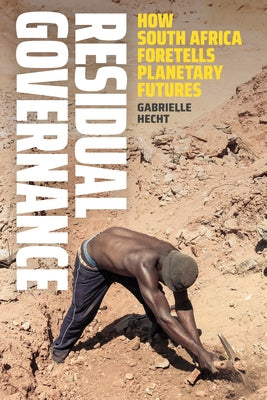Description
In Residual Governance, Gabrielle Hecht dives into the wastes of gold and uranium mining in South Africa to explore how communities, experts, and artists fight for infrastructural and environmental justice. Hecht outlines how mining in South Africa is a prime example of what she theorizes as residual governance--the governance of waste and discard, governance that is purposefully inefficient, and governance that treats people and places as waste and wastelands. She centers the voices of people who resist residual governance and the harms of toxic mining waste to highlight how mining's centrality to South African history reveals the links between race, capitalism, the state, and the environment. In this way, Hecht shows how the history of mining in South Africa and the resistance to residual governance and environmental degradation is a planetary story: the underlying logic of residual governance lies at the heart of contemporary global racial capitalism and is a major accelerant of the Anthropocene.
Author: Gabrielle Hecht
Publisher: Duke University Press
Published: 11/10/2023
Pages: 288
Binding Type: Paperback
Weight: 1.19lbs
Size: 9.01h x 6.10w x 0.36d
ISBN13: 9781478024941
ISBN10: 1478024941
BISAC Categories:
- Social Science | Ethnic Studies | African Studies
- Nature | Environmental Conservation & Protection | General
- Business & Economics | Real Estate | General
Author: Gabrielle Hecht
Publisher: Duke University Press
Published: 11/10/2023
Pages: 288
Binding Type: Paperback
Weight: 1.19lbs
Size: 9.01h x 6.10w x 0.36d
ISBN13: 9781478024941
ISBN10: 1478024941
BISAC Categories:
- Social Science | Ethnic Studies | African Studies
- Nature | Environmental Conservation & Protection | General
- Business & Economics | Real Estate | General
About the Author
Gabrielle Hecht is Professor of History at Stanford University, author of Being Nuclear: Africans and the Global Uranium Trade and The Radiance of France: Nuclear Power and National Identity after World War II, and editor of Entangled Geographies: Empire and Technopolitics in the Global Cold War.

